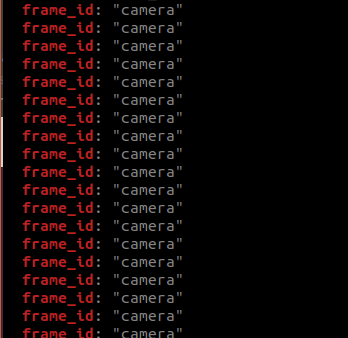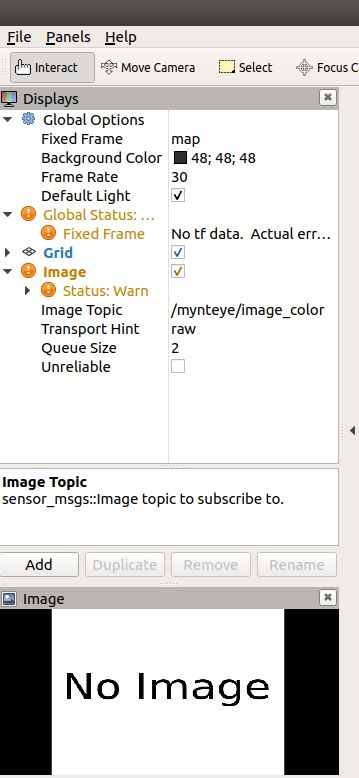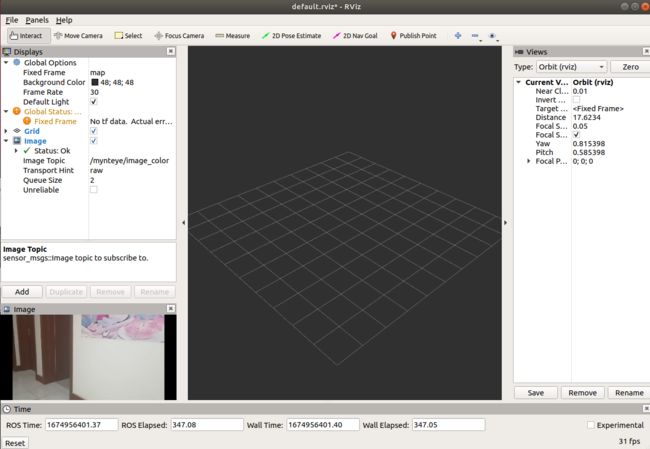.mp4 文件转化成 .bag 文件并在 rviz 中显示
文章目录
-
-
- 一、Python实现.mp4和.bag相互转化
-
- 1、.mp4转.bag
- 验证是否转换成功:使用 rosplay
- 2、.bag转.mp4
- 二、rviz 读取 *.bag 数据包并显示
-
- 1、查看bag数据包的基本信息
- 2、rviz 显示信息
-
一、Python实现.mp4和.bag相互转化
1、.mp4转.bag
# -*- coding: utf-8 -*-
##import logging
##logging.basicConfig()
import time ,sys ,os
import rosbag
import roslib,rospy
from cv_bridge import CvBridge
import cv2
from sensor_msgs.msg import Image
TOPIC = 'camera/image_raw'
def my_resize(my_img,x,y):
resized = cv2.resize(my_img,( int(my_img.shape[1]*x),int(my_img.shape[0]*y) ))
return resized
def CreateVideoBag(videopath, bagname):
'''Creates a bag file with a video file'''
print(videopath)
print(bagname)
bag = rosbag.Bag(bagname, 'w')
cap = cv2.VideoCapture(videopath)
cb = CvBridge()
# prop_fps = cap.get(cv2.cv.CV_CAP_PROP_FPS) # 源代码是这个,不能正常运行
prop_fps = cap.get(cv2.CAP_PROP_FPS) # 帧速率
if prop_fps != prop_fps or prop_fps <= 1e-2:
print ("Warning: can't get FPS. Assuming 24.")
prop_fps = 24
print(prop_fps)
ret = True
frame_id = 0
while(ret):
ret, frame = cap.read()
if not ret:
break
frame = cv2.resize(frame,( 960,540 ))
stamp = rospy.rostime.Time.from_sec(float(frame_id) / prop_fps)
frame_id += 1
image = cb.cv2_to_imgmsg(frame, encoding='bgr8')
image.header.stamp = stamp
image.header.frame_id = "camera"
bag.write(TOPIC, image, stamp)
cap.release()
bag.close()
if __name__ == "__main__":
CreateVideoBag('./123.mp4','./123.bag')
##if __name__ == "__main__":
## if len( sys.argv ) == 3:
## CreateVideoBag(*sys.argv[1:])
## else:
## print( "Usage: video2bag videofilename bagfilename")
运行方式: 修改话题名TOPIC、videopath、bagname后直接F5运行代码
或者
参考链接:https://stackoverflow.com/questions/31432870/how-do-i-convert-a-video-or-a-sequence-of-images-to-a-bag-file
import time, sys, os
from ros import rosbag
import roslib, rospy
roslib.load_manifest('sensor_msgs')
from sensor_msgs.msg import Image
from cv_bridge import CvBridge
import cv2
TOPIC = 'camera/image_raw'
def CreateVideoBag(videopath, bagname):
'''Creates a bag file with a video file'''
print videopath
print bagname
bag = rosbag.Bag(bagname, 'w')
cap = cv2.VideoCapture(videopath)
cb = CvBridge()
# prop_fps = cap.get(cv2.cv.CV_CAP_PROP_FPS) # 源代码是这个,不能正常运行
prop_fps = cap.get(cv2.CAP_PROP_FPS) # 我该成了这个
if prop_fps != prop_fps or prop_fps <= 1e-2:
print "Warning: can't get FPS. Assuming 24."
prop_fps = 24
prop_fps = 24 # 我手机拍摄的是29.78,我还是转成24的。
print prop_fps
ret = True
frame_id = 0
while(ret):
ret, frame = cap.read()
if not ret:
break
stamp = rospy.rostime.Time.from_sec(float(frame_id) / prop_fps)
frame_id += 1
image = cb.cv2_to_imgmsg(frame, encoding='bgr8')
image.header.stamp = stamp
image.header.frame_id = "camera"
bag.write(TOPIC, image, stamp)
cap.release()
bag.close()
if __name__ == "__main__":
if len( sys.argv ) == 3:
CreateVideoBag(*sys.argv[1:])
else:
print( "Usage: video2bag videofilename bagfilename")
运行方式: python Video2ROSbag.py TLout.mp4 TLout.bag
验证是否转换成功:使用 rosplay
rosbag info TLout.bag # 查看 bag 包信息
rosbag play -l TLout.bag camera/image_raw:=image_raw0 # 循环播放图片,并重命名成自己需要的话题名
rqt_image_view # 显示播放的图片,能正常显示说明ros包制作成功。
2、.bag转.mp4
# -*- coding: utf-8 -*-
#!/usr/bin/env python2
import roslib
#roslib.load_manifest('rosbag')
import rospy
import rosbag
import sys, getopt
import os
from sensor_msgs.msg import CompressedImage #压缩图片
from sensor_msgs.msg import Image
import cv2
import numpy as np
import shlex, subprocess #读取命令行参数
#subprocess 是一个 python 标准类库,用于创建进程运行系统命令,并且可以连接进程的输入输出和
#错误管道,获取它们的返回,使用起来要优于 os.system,在这里我们使用这个库运行 hive 语句并获取返回结果。
#shlex 是一个 python 标准类库,使用这个类我们可以轻松的做出对 linux shell 的词法分析,在
#这里我们将格式化好的 hive 连接语句用 shlex 切分,配合 subprocess.run 使用。
MJPEG_VIDEO = 1
RAWIMAGE_VIDEO = 2
VIDEO_CONVERTER_TO_USE = "ffmpeg" # or you may want to use "avconv" #视频转换器
def print_help():
print('rosbag2video.py [--fps 25] [--rate 1] [-o outputfile] [-v] [-s] [-t topic] bagfile1 [bagfile2] ...')
print()
print('Converts image sequence(s) in ros bag file(s) to video file(s) with fixed frame rate using',VIDEO_CONVERTER_TO_USE)
print(VIDEO_CONVERTER_TO_USE,'needs to be installed!')
print()
print('--fps Sets FPS value that is passed to',VIDEO_CONVERTER_TO_USE)
print(' Default is 25.')
print('-h Displays this help.')
print('--ofile (-o) sets output file name.')
print(' If no output file name (-o) is given the filename \'.mp4\' is used and default output codec is h264.' 使用方法:
$ python rosbag2video.py [-h] [-s] [-v] [-r] [-o outputfile] [-t topic] [-p prefix_name] [--fps 25] [--rate 1.0] [--ofile output_file_name] [--start start_time] [--end end_time] bagfile1 [bagfile2] ...
二、rviz 读取 *.bag 数据包并显示
1、查看bag数据包的基本信息
已有数据:test_room1.bag
查看.bag信息:rosbag info test_room1.bag
 可以看出 topic:/mynteye/image_color
可以看出 topic:/mynteye/image_color
查看frame_id
//打开终端
roscore
//打开新终端 播放数据
rosbag play test_room1.bag
// 打开新终端 查看/velodyne_points的frame_id
rostopic echo /mynteye/image_color | grep frame_id
若想更改frame_id,可以参考:改变ros bag 中消息的frame_id 和话题名
2、rviz 显示信息
执行以下命令:
roscore
//打开新终端
rosrun rviz rviz
// 打开rviz
rviz 设置:add->image
image 设置:Image Topic 设置为 /mynteye/image_color(上面info显示的topic)
播放bag包:rosbag play nsh_indoor_outdoor.bag
显示结果:
若需要显示的是点云,则需要设置pointcloud2
设置rviz:add->PointCloud2
设置:
fix-frame=camera
topic:/mynteye/image_color


